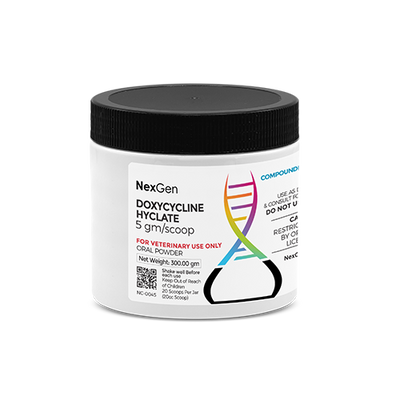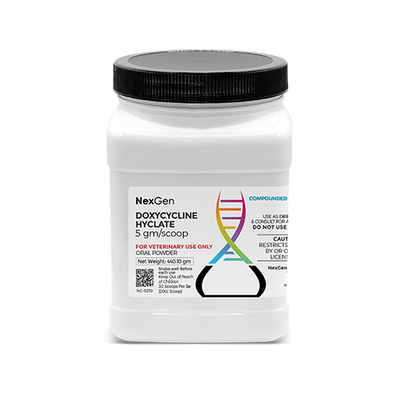
Doxycycline Hyclate 5 gm/scoop, Oral Powder, 60 Scoops (20cc Scoop)
Login for pricing
- Brand
- Mixlab
- SKU:
- NC-0218
- Product Type:
- Powder
- Size:
- 64oz
- Administration:
- Oral
- Scoops Per Container:
- 60
- Scoop Size:
- 20cc
Bacterial diseases are quite common in the horse, with skin and gastrointestinal (GI) infections being the most frequently-occurring. Less frequently, bacterial infections will affect a horse’s respiratory tract. Bacterial skin diseases (pyoderma) are most often caused by Staphylococcus species, usually Corynebacterium pseudotuberculosis or Dermatophilus congolensis. The most common clinical signs associated with these infections are crusts, papules and abscesses.1 The most common symptom of GI infections in horses is diarrhea.
More often than not, a horse’s immune system is able to overcome bacterial intrusions without the horse developing clinical signs of sickness. In a majority of cases, bacterial disease occurs when the horse’s immune system has been weakened and bacteria are able to replicate and spread throughout the horse’s body.
Healthy adult horses are typically resistant to most bacterial disease, with foals and geriatric horses being at greater risk of developing bacterial disease due to the fact that their immune systems are not as robust as those of younger horses.2 Bacterial infections are also more common in horses that travel or frequent stables where many horses congregate.
When a horse shows clinical signs of bacterial disease, the source of bacteria is usually often contaminated water, food or feces that are subsequently ingested. In the case of some bacterial infections (e.g., skin, respiratory), the causative agent may be present in the environment. Tick-borne diseases are also a concern; these can be difficult to diagnose, because these ailments (e.g., Lyme Disease, Equine piroplasmosis, Anaplasmosis) often have more than one symptom.
Where to buy Doxycycline Hyclate
Doxycycline is available in the U.S. through pharmaceutical manufacturers and through veterinary custom compounding companies.
Please consult your veterinarian prior to beginning any treatment regimen.
FOR RX ONLY: A valid prescription from a licensed veterinarian is required for dispensing this medication.
1White, S. Equine Bacterial and Fungal Diseases: A Diagnostic and Therapeutic Update. Clinical Techniques in Equine Practice, Volume 4, Issue 4, December 2005, Pages 302-310.
2Panchaud Y, Gerber V, Rossano A, Perreten V. Bacterial infections in horses: a retrospective study at the University Equine Clinic of Bern. Schweiz Arch Tierheilkd. 2010 Apr;152(4):176-82. doi: 10.1024/0036-7281/a000040. PMID: 20361396.
4cdc.gov.















